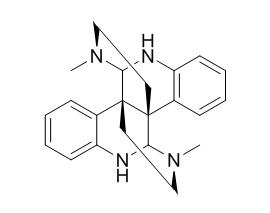Calycanthine
D-calycanthine has antifungal activity, it shows significant inhibitory activities against five plant pathogenic fungi Exserohilum turcicum, Bipolaris maydis, Alternaria solani, Sclerotinia sderotiorum, and Fusarium oxysportium.
Inquire / Order:
manager@chemfaces.com
Technical Inquiries:
service@chemfaces.com
Tel:
+86-27-84237783
Fax:
+86-27-84254680
Address:
1 Building, No. 83, CheCheng Rd., Wuhan Economic and Technological Development Zone, Wuhan, Hubei 430056, PRC
Providing storage is as stated on the product vial and the vial is kept tightly sealed, the product can be stored for up to
24 months(2-8C).
Wherever possible, you should prepare and use solutions on the same day. However, if you need to make up stock solutions in advance, we recommend that you store the solution as aliquots in tightly sealed vials at -20C. Generally, these will be useable for up to two weeks. Before use, and prior to opening the vial we recommend that you allow your product to equilibrate to room temperature for at least 1 hour.
Need more advice on solubility, usage and handling? Please email to: service@chemfaces.com
The packaging of the product may have turned upside down during transportation, resulting in the natural compounds adhering to the neck or cap of the vial. take the vial out of its packaging and gently shake to let the compounds fall to the bottom of the vial. for liquid products, centrifuge at 200-500 RPM to gather the liquid at the bottom of the vial. try to avoid loss or contamination during handling.
J Med Chem.2023, 66(6):4106-4130.
Phytochem Anal.2023, pca.3305.
Drug Des Devel Ther.2020, 14:61-71
Antioxidants (Basel).2020, 9(6):544.
Natural Product Communications2020, doi: 10.1177.
Chemistry of Vegetable Raw Materials2019, 3:119-127
ARPN Journal of Eng.& Applied Sci.2016, 2199-2204
Toxicological Research2020, doi: 10.1007.
J-STAGE2015, 249-255
Int Immunopharmacol.2019, 71:361-371
Related and Featured Products
Chem Biodivers. 2009 Jun;6(6):838-45.
Antifungal activity of alkaloids from the seeds of Chimonanthus praecox.[Pubmed:
19551726 ]
Two alkaloids, D-Calycanthine (1) and L-folicanthine (2), were isolated from the active MeOH extract of the seeds of Chimonanthus praecox LINK.
METHODS AND RESULTS:
The structures of the two compounds were established by (1)H- and (13)C-NMR, and MS (FAB, ESI) analyses. In the in vitro tests, compounds 1 and 2 showed significant inhibitory activities against five plant pathogenic fungi Exserohilum turcicum, Bipolaris maydis, Alternaria solani, Sclerotinia sderotiorum, and Fusarium oxysportium, among which B. maydis was found to be the most susceptible to 1 with an EC(50) value of 29.3 microg/ml, followed by S. sderotiorum to 2 with an EC(50) value of 61.2 microg/ml.
CONCLUSIONS:
To our knowledge, this is the first report of isolation and LC/MS/MS identification as well as of antifungal properties of these alkaloids from the seeds of this plant.
J Asian Nat Prod Res. 2013;15(3):270-5.
Two new coumarin glycosides from Chimonanthus nitens.[Pubmed:
23421779]
METHODS AND RESULTS:
Two new coumarin glycosides, namely nitensosides A-B (1-2), together with six known compounds, scopolin (3), 5,6,7-trimethoxycoumarin (4), d-Calycanthine (5), calycanthoside (6), xeroboside (7), and scopoletin (8), were isolated from Chimonanthus nitens.
CONCLUSIONS:
The structures of the new compounds were elucidated by comprehensive analysis of IR, MS, and NMR spectroscopic data. Compounds 3, 4, 7, and 8 showed moderate inhibitory activity against Micrococcus luteus.



